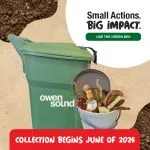
Kincardine Council was able to hear the results recently of the municipality’s Food Cycler Pilot Program.
The program started looking for households to participate in March of this year, and have participants answer questions about how much less garbage they were producing.
Jessica Taylor, who is the Municipal Program Manager at Food Cycle Science, shared a report this week to the council.
In the final report, she shared that 210 households took part and were able to purchase the appliances, that were subsidized by the Municipality of Kincardine and the Municipal Innovation Council.
During the program, the 210 households were able to divert what would work out to 62.5 metric tonnes of food waste from the landfill, and would in turn divert 81.3 metric tonnes of CO2 equivalents per year.
By producing less food waste that would end up in landfills, those households could reduce their greenhouse gas emissions which would be equal to taking 18 gas-powered vehicles off the road every year.
Of the 210 households that took part, 99% said that they’d continue using their Food Cycler, and 88% would recommend the appliance to others.
The results also found that 72.7% gained increased awareness of their household food waste and that it motivated them to waste less.
The goal of the Food Cycler program was to divert food waste from landfills and to find a viable option for processing organic waste.











